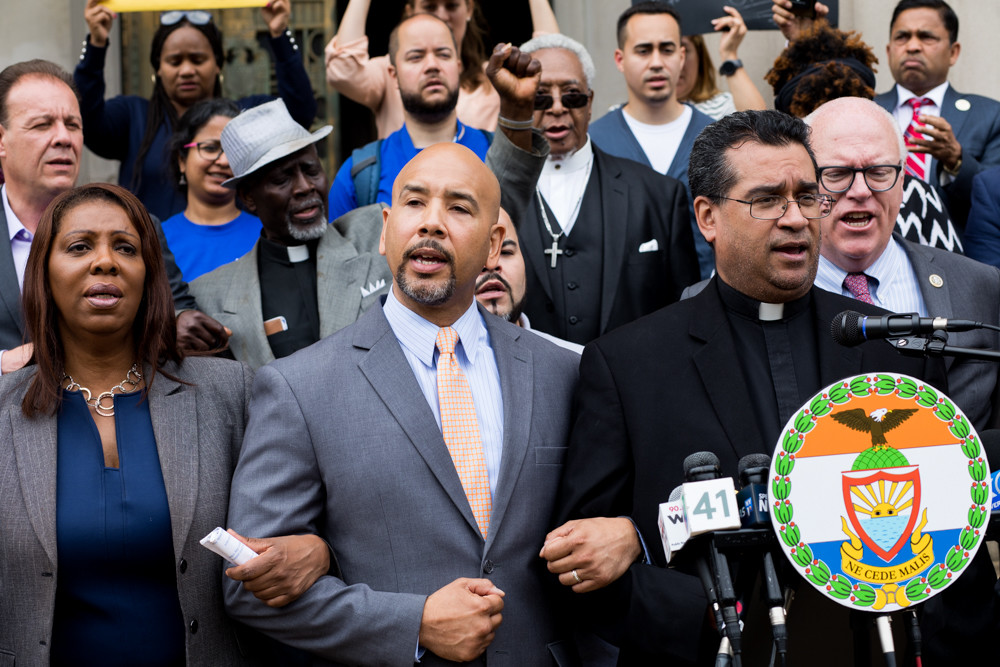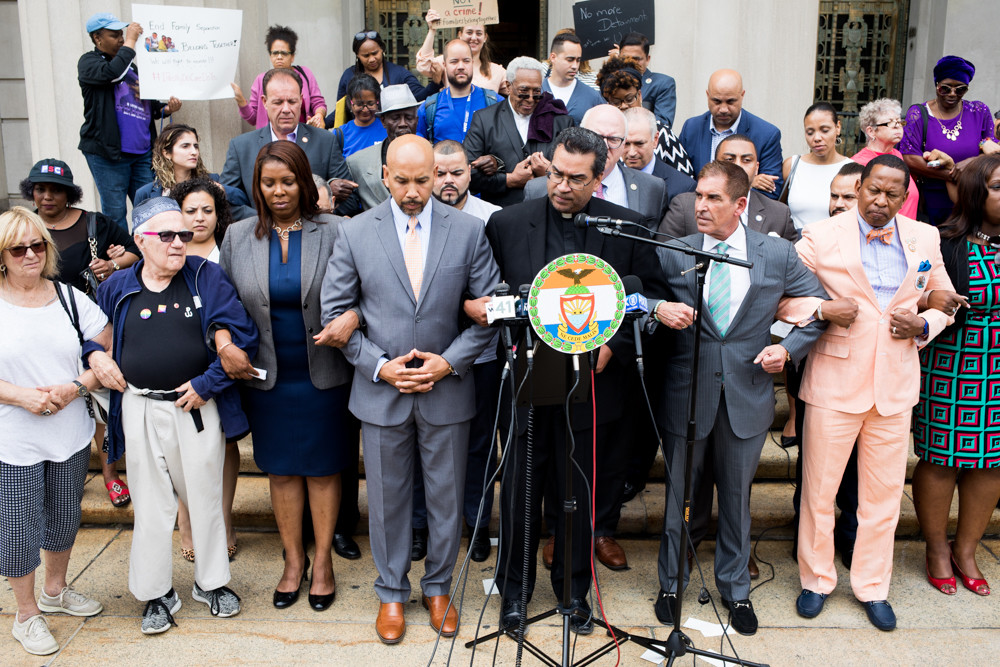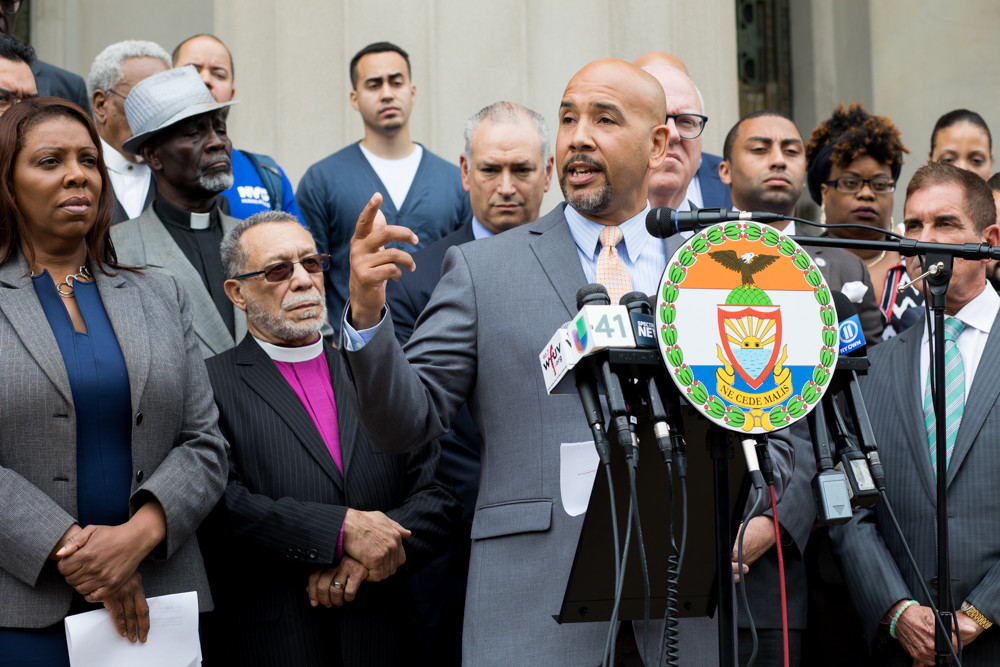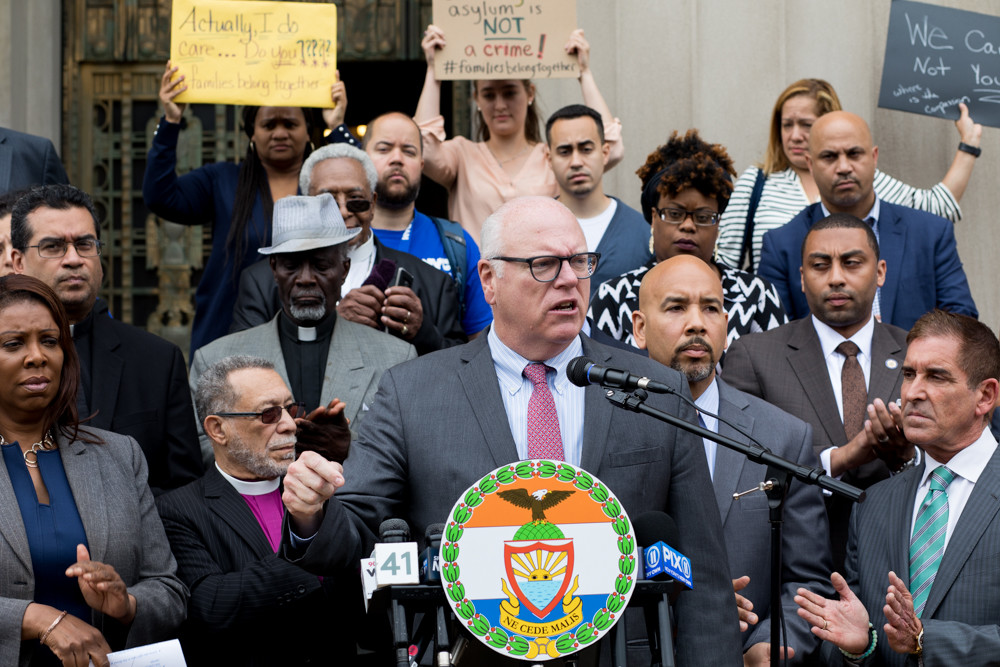Bronxites rally for immigrant kids parked here after border round-up
Some critics have viewed President Donald Trump’s “zero tolerance” immigration policy on illegal border crossings a disaster, and his administration has been anything but transparent.
Even after Trump signed an executive order that would reportedly end family separations last week, confusion still reigned over how more than 2,300 children already removed from their parents will be reunited. Especially after those children were scattered to different parts of the country, including both the Bronx and Yonkers.
Two organizations Bronx borough president Ruben Diaz Jr., believes is housing these children are Catholic Guardian Services and Lutheran Social Services of New York. Both have federal contracts to provide services for “unaccompanied minors” — children who arrived at the U.S. border without parents or family. In recent days however, these groups have taken on new children. Diaz believes those kids are related to the new Trump policy.
Lutheran Social Services did not respond to multiple requests for comment, while Catholic Guardian Services executive director Craig Longley referred a reporter’s questions to the U.S. Department of Health and Human Services’ Administration for Children and Families, which also didn’t respond to questions.
Looking for the children
Finding out exactly where in the borough the children are housed has proved exceedingly difficult, said Bryant Daniels, public affairs director for U.S. Rep. Eliot Engel. The Trump administration is “going out of their way to stonewall the elected officials,” Daniels said, although he’s fairly certain the children aren’t sheltered in northwest Bronx neighborhoods, including Riverdale and Kingsbridge.
But they are reportedly just north of the city line in Yonkers. The Rising Ground facility on Hawthorne Avenue, formerly known as Leake and Watts, is believed to be housing children separated from their parents, according to Engel, joining three other Westchester County locations.
Meredith Barber, Rising Ground’s senior director of institutional advancement, did not directly answer questions, referring a reporter to a letter from executive director Alan Mucatel, who wrote “these children are receiving the support and care one would hope would greet each of us were it our time of need.”
Before the latest Trump policy, Rising Ground spent four years housing unaccompanied migrant children.
“We fully understand that these children have had tremendously difficult experiences before coming to us, as well as along their journey here, and that their trauma and their reactions to what they have experienced must be in the forefront as we work with them,” Mucatel said.
Engel and other elected officials were set to tour Rising Ground last Saturday, but were never allowed inside.
Health and Human Services “rejected our request, and said come back in two weeks,” Daniels said. “Rising Ground said they’d welcome us if HHS and the administration would allow it, but they did not.”
As for the number of children there, Daniels isn’t certain, “but we have reason to believe it’s less than 20,” he said.
“We also have no details about how reunification might take place,” Daniels added, “which is part of the reason (Engel) introduced legislation to force the State Department to work with our embassies from Central America to reunite these families.”
Pointing fingers
But as Daniels sees it, facilities like Rising Ground are not the problem — or “anyone’s enemy.”
“It’s the administration that is tearing families apart and shipping kids across the country without any real concern for their well-being or the well-being of their families,” Daniels said. “It’s important to keep that in mind and not vilify people who are trying to help these vulnerable populations.”
Ivan Braun, who helped organize the group Welcoming Neighbors Northwest Bronx last year after city officials announced a new transitional housing facility on Broadway, said he views Trump’s policy as “horrible” and “inhumane.”
“It’s immoral to take a child away from its parents,” Braun said. “The child has done nothing wrong. You’re torturing kids. You can’t say too much bad about it.”
But it’s more than a moral abomination, Braun said.
“From a practical point of view, you’re going to create a whole lot of animosity,” Braun said. “You’re going to have kids who don’t like authority, who don’t like the United States.”
Trump’s zero-tolerance stance falls in line with what activist David Knapp describes as the administration’s tendency toward criminalizing immigrants, painting them as “gang members,” “insects” and “viruses.”
“The goal is to desensitize Americans,” said Knapp, co-founder of the grassroots political group Northwest Bronx Indivisible. “‘Why do we care about immigrants? They’re bad for our country. They don’t bring any value. They’re only a drag on our economy. They’re only a drag in terms of the culture. And they basically take away a lot more than they give.’”
That’s created a deep-seated distrust toward Trump, not least among some of Knapp’s own neighbors.
“Riverdale, Kingsbridge, Marble Hill is a very heavily mixed community in terms of immigrants and people of color, so there’s an unease,” Knapp said. “No one knows how to respond. The fabric of our multi-racial, multi-ethnic society is being challenged by some of these policies.”
Similar to Braun, Jone Johnson Lewis, leader of the Riverdale-Yonkers Society for Ethical Culture, fears separating children from their families creates “lasting psychological damage.”
“It just appalls me that these children are taken so far from their families when there was no need in the first place to separate them,” Lewis said.
It also spits in the face of her society’s “firm belief in the human worth of every person.”
“We are treating these children as less than luggage,” Lewis said. “It just baffles my mind how people can decide to be that punitive to people who are, for the most part, seeking refuge — just as many of our parents and grandparents were.”
A broken system
Even some Bronx Republicans view Trump’s policy as deeply flawed, including Spuyten Duyvil resident Judah Powers, who unsuccessfully challenged Councilman Andrew Cohen for his seat last November.
“We need to recognize that it’s bad policy and that it should be stopped properly,” Powers said.
“Our immigration system needs to be fixed. But at the same time, our immigration system has to be enforced. Most Americans will agree that children should be with their parents and that we shouldn’t be separating families and putting kids in suspect situations.”
If there’s anything the nation can glean from this, Braun said, it should look deeply into all of the ways in which families have been ripped apart in this country, starting with what was done to Native Americans.
“The whole slave trade was based on ripping families apart,” Braun said. “I would hope there would be some serious soul-searching about this, and we move forward in a more humane manner.”













